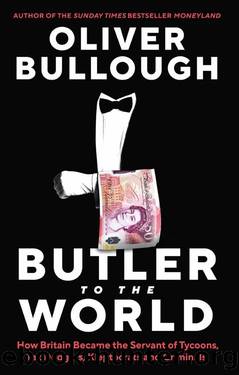Butler to the World: The Book the Oligarchs Donât Want You to Read - How Britain Helps the World's Worst People Launder Money, Commit Crimes, and Get Away with Anything by Oliver Bullough

Author:Oliver Bullough
Language: eng
Format: mobi, epub, azw3
Tags: Non-Fiction, Finance, Business, True Crime, Economics, United Kingdom, Politics, History
ISBN: 9781782837398
Publisher: Profile
Published: 2022-03-09T16:00:00+00:00
If Mullin thought he had his enemies on the run, therefore, he was wrong. It turned out that not only were they not going to submit to additional regulation without a battle, but they had also, unnoticed by anyone, been quietly fighting this war long before anyone else realised it was even happening. Intensive lobbying from the private equity industry had already managed to doom proposals made in 2003 for a total overhaul of partnership law, which would have among other things removed the irrational distinction between Scottish and English limited partnerships. Then they had gone on the offensive. Literally within a week of the announcement of the consultation into Scottish limited partnerships came a second announcement, which he remains amazed by.
âSo, at the same time that I was pursuing SLPs, along came this move from the Regulatory Reform Committee to create a limited partnership for fund managers in London,â he said.
Mullin, supported by anti-corruption groups in Britain and across Europe, was seeking to tighten regulations on SLPs, so they could no longer be used to launder billions of stolen dollars. The idea was to prevent crooks from looting desperately poor countries, and instead give those countries a chance of building sustainable economies.
Unbeknownst to Mullin and indeed to pretty much everyone else, the Treasury and the private equity industry were actually seeking to loosen those same regulations, so limited partnerships would have to report even less information to the authorities than they already did. They had no interest in whether Eastern European money launderers could or could not do business, but they did want investments to be even more profitable than they already were. Remember how the Bank of England doomed controls on international money flows in the 1950s? The Treasury was doing exactly the same thing now.
And the Treasury had a great advantage in this battle, thanks to a little-known provision in parliamentary rules called a legislative reform order. To get tighter restrictions on SLPs, Mullin needed to pass an actual law, have it read three times in both houses of Parliament with scrutiny and debate, and gain royal assent, as well as the rest of the parliamentary rigmarole. But an LRO is a formality passed by a simple vote in committee. Even better, an LRO can only be used to deregulate, to remove obstacles to business, not to regulate. Even had he wanted to, Mullin could not have used this tool to secure his goals. An LRO is like a built-in ratchet, deliberately designed to make it easy to remove regulations, while forcing the advocates of greater restrictions to win their battles the hard way. Itâs the butlerâs creed: free to those that can afford it, very expensive to those that canât.
Perhaps if Mullin had been in Parliament for longer he wouldnât have been shocked by this, but he was still new to the job, and it felt like his opponents had cheated. The mechanism they had used was intended only for ânon-controversial mattersâ, according to the rules,
Download
Butler to the World: The Book the Oligarchs Donât Want You to Read - How Britain Helps the World's Worst People Launder Money, Commit Crimes, and Get Away with Anything by Oliver Bullough.epub
Butler to the World: The Book the Oligarchs Donât Want You to Read - How Britain Helps the World's Worst People Launder Money, Commit Crimes, and Get Away with Anything by Oliver Bullough.azw3
This site does not store any files on its server. We only index and link to content provided by other sites. Please contact the content providers to delete copyright contents if any and email us, we'll remove relevant links or contents immediately.
The Secret History by Donna Tartt(19092)
The Social Justice Warrior Handbook by Lisa De Pasquale(12191)
Thirteen Reasons Why by Jay Asher(8912)
This Is How You Lose Her by Junot Diaz(6889)
Weapons of Math Destruction by Cathy O'Neil(6281)
Zero to One by Peter Thiel(5802)
Beartown by Fredrik Backman(5756)
The Myth of the Strong Leader by Archie Brown(5509)
The Fire Next Time by James Baldwin(5447)
How Democracies Die by Steven Levitsky & Daniel Ziblatt(5219)
Promise Me, Dad by Joe Biden(5154)
Stone's Rules by Roger Stone(5088)
A Higher Loyalty: Truth, Lies, and Leadership by James Comey(4964)
100 Deadly Skills by Clint Emerson(4927)
Rise and Kill First by Ronen Bergman(4790)
Secrecy World by Jake Bernstein(4753)
The David Icke Guide to the Global Conspiracy (and how to end it) by David Icke(4720)
The Farm by Tom Rob Smith(4514)
The Doomsday Machine by Daniel Ellsberg(4490)
